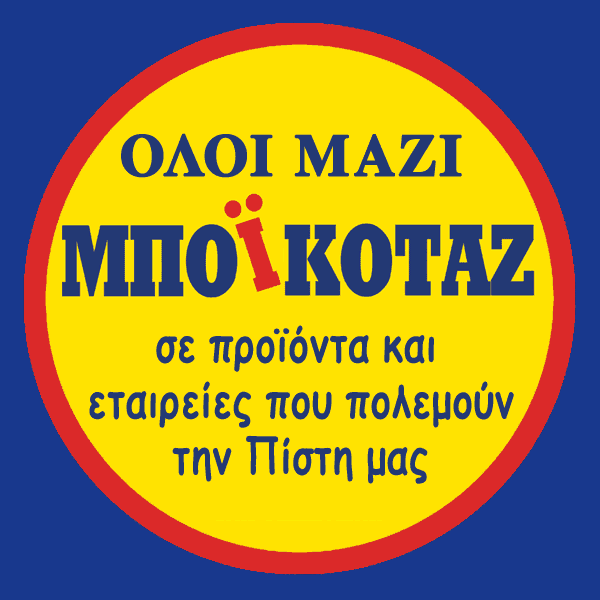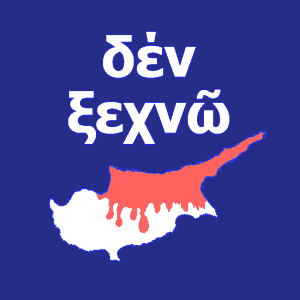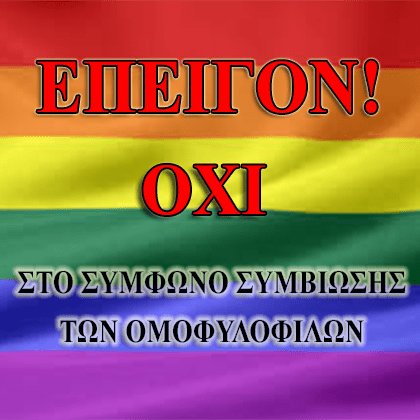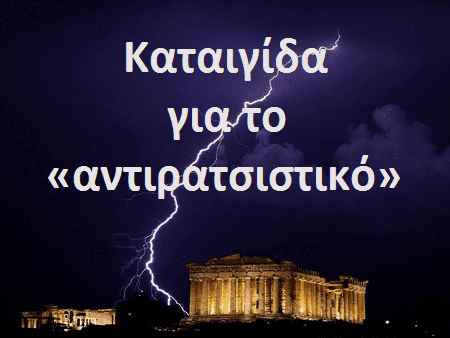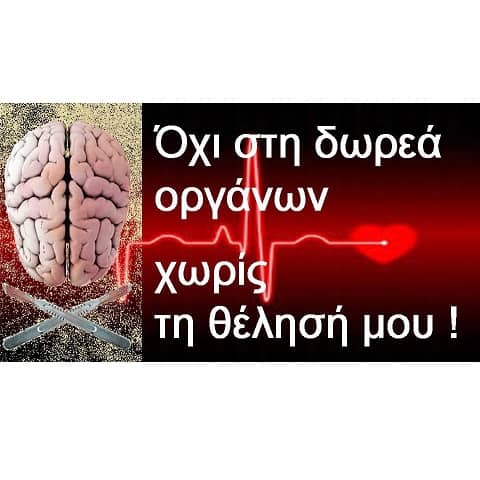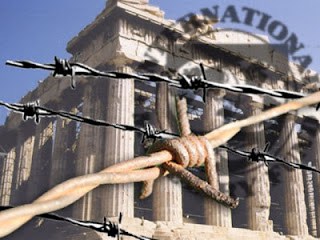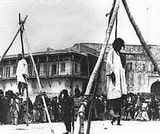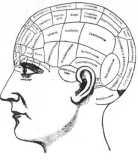Η ελληνική γλώσσα: βάση των δυτικων
Greek language –the basis for western languages .
A presentation for the common people
by professor DR John Karalas
1 introduction
2. importance of greek language
3. some history of greek language
4.why greek is the language of philosophy and religion?
5. some etymology, your English name has meaning
6.one day of mr. lee (full of greek words)
7.greek structure-meaning
8.Greek and chinese
9.外來語
1 introduction
Starting from the film :my fat Greek wedding, “all the words all over the world are from Greek origin”
But is that true?
Look at these speeches. You may think it is in English, but you are wrong! It is plain Greek.! All.
|
The speach of Mr. Zolotas at meeting of the members of the International Monetary Union in 1957: |
|
Kyrie, I eulogize the archons of the Panethnic Numismatic Thesaurus and the Ecumenical Trapeza for the orthodoxy of their axioms, methods and policies, although there is an episode of cacophony of the Trapeza with Hellas. With enthusiasm we dialogue and synagonize at the synods of our didymous organizations in which; polymorphous economic ideas and dogmas are analyzed and synthesized. Our critical problems such as-the numismatic plethora generate some agony and melancholy. This phenomenon is characteristic of our epoch. But, to my thesis, we have the dynamism to program therapeutic practices as a prophylaxis from chaos and catastrophe. In parallel, a Panethnic un-hypocritical economic synergy and harmonization in a democratic climate is basic. I apologize for my eccentric monologue. I emphasize my euharistia to you, Kyrie to the eugenic arid generous American Ethnos and to the organizes and protagonists of his Amphictony and the gastronomic symposia".
"It is Zeus' anathema on our epoch for the dynamism of our economies and the heresy of our economic methods and policies that we should agonize between the Scylla of numismatic plethora and the Charybdes of economic anemia. ''Our policies should be based more on economic and less on political criteria. "Although they emphatically stigmatize numismatic plethora, they energize it through their tactics and practices. "Our gnomon has to be a metron between economic strategic and philanthropic scopes. Political magic has always been anti-economic. "In an epoch characterized by monopolies, oligopolies monopolistic antagonism and polymorphous inelasticities, our policies have to be metamorphosed into plethorophobia. which is endemic among academic economists. "Numismatic symmetry should to antagonize economic acme. "A greater harmonization between the practices of the economic and numismatic archons is basic. "Parallel to this, we have to synchronize and harmonize more our economic and numismatic policies pan-ethnically. "These scopes are more practicable now, when the prognostics of the political and economic barometer are halcyonic. "The history of our didimous organizations in this sphere has been didactic and their gnostic practices will always be a tonic to the polyonymous and idiornorphous ethnical economies. The genesis of the programmed organization will dynamize these policies. Therefore, I sympathize, although not without criticism on one or two themes, with the apostles and the hierarchy of our organizations in their zeal to program orthodox economic and numismatic policies. "I apologize for having tyrannized you with my Hellenic phraseology.
"In my epilogue, I emphasize my eulogy to the philoxenous autochthons of this cosmopolitan metropolis and my encomium to you, Kyrie and the stenographers. |
The genesis of classical drama was not symptomatic. Aneuphoria of charismatic and talented protagonists showed fantastic scenes of historic episodes. The prologue, the theme and the epilogue, comprised the trilogy of drama while synthesis, analysis and synopsis characterized the phraseology of the text. The syntax and phraseology used by scholars, academicians and philosophers in their rhetoric, had many grammatical idioms and idiosyncrasies.
The protagonists periodically used pseudonyms. Anonymity was a syndrome that characterized the theatrical atmosphere.
The panoramic fantasy, the mystique, the melody, the aesthetics, the use of the cosmetic epithets are characteristics of drama.
Eventhrough the theaters were physically gigantic, there was noneed for microphones because the architecture and the acoustics would echo isometrically and crystal - clear. Many epistomologists of physics, aerodynamics, acoustics, electronics, electromagnetics can not analyze - explain the ideal and isometric acoustics of Hellenic theaters even today.
There were many categories of drama: classical drama, melodrama, satiric, epic, comedy, etc. The syndrome of xenophobia or dyslexia was overcome by the pathos of the actors who practiced methodically and emphatically. Acrobatics were also euphoric. There was a plethora of anecdotal themes, with which the acrobats would electrify the ecstatic audience with scenes from mythical and historical episodes.
Some theatric episodes were characterized as scandalous and blasphemous. Pornography, bigamy, hemophilia, nymphomania, polyandry, polygamy and heterosexuality were dramatized in a pedagogical way so the mysticism about them would not cause phobia or anathema or taken as anomaly but through logic, dialogue and analysis skepticism and the pathetic or cryptic mystery behind them would be dispelled.
It is historically and chronologically proven that theater emphasized pedagogy, idealism and harmony. Paradoxically it also energized patriotism a phenomenon that symbolized ethnically character and phenomenal heroism.
In Europe we say for something we do not understand "For my own part, it was Greek to me.",表示他完全不知道西塞罗说的是什么。
现在,be Greek to somebody这一短语被人们用来表示这样的含义:beyond one's understanding,也就是“完全不懂,一窍不通”。
But hear I am the only one who can not say this , for I am a Greek.
But is that true.? We do not know greek at all? Do we know the greek alphabet? YES. In school we know from mathematics many greek letters , like γ, χ, ω, ψ, τ , δ, of course the famous π. How about Δ Delta force, a computer game? or λ ?
2. importance of greek language
We think Greek is a foreign language written in a foreign alphabet. Yet we speak and write Greek every day without realizing it. Our Alphabet comes from Greek. Our Vocabulary is filled with Greek. Much can be said of the broad understanding of language and culture which can be gained through studying Greek.
The unprecedented genius of Ancient Greece remains unexplained. Why the sudden surge of "civilized" activities: drama, poetry, philosophy, mathematics,(all Greek words) and even science? It was all because the Ancient Greeks developed an alphabet that included vowels in addition to the consonants. The Greek language became a full phonetic representation of language. The left side of our brain, it seems, is much more capable than the right in matters phonetic. In contrast, other forms of writing in the ancient world, such as hieroglyphics and vowelless alphabets, are better handled by the right side of the brain.
Vowels in Hebrew don't distinguish different words, just
different forms of the same word.
(As an aside, it is interesting that, in the modern world, Japanese and Chinese are better processed by the right side of the brain, while the phonetic representations of language, such as English, are handled better sinistrally.)
Back in Ancient Greece, the new alphabet shifted language activities to the left side of the brain. According to J.R. Skoyles, this "unlocked" left-brain competences that had previously been analogous right-brain competences. The newly liberated competences involved rational, analytical, and logical faculties. Thus from the addition of a few vowels sprang Ancient Greece and, in time, modern civilization. (Another aside: Each side of the brain seems to have the potential for performing all necessary functions, but the left side is better at some than the right, and vice versa. Sometimes one side produces better answers than the other. Skoyle's point is that the Greek invention of a phonetic language unlocked or made dominant the left side with its superior civilizing capabilities! (Skoyles, John R.; "Alphabet and the Western Mind," Nature, 309:409, 1984.)
Chinese tend to think of language as something being written; our language is the writing. Language to a Westerner is spoken. There were thousands of dialects in China, of course, the Beijing dialect (Mandarin), the Nanjing dialect, the Canton dialect, etc. But dialects are dialects. The Swiss understand this paradox; they will tell you that there is no schwitzerdüütsch, only Baslerdüütsch, Berndüütsch, Zuridüütsch, etc. The Swiss of Germanic origin have to adopt the writing of Germany as their official writing in order to retain a consistency in grammar and spelling. The Chinese have no such problem. The Chinese writing is Chinese, not Mandarin nor Cantonese. Chinese cannot write down their dialects in different scripts like the Swiss do, because the Chinese writing is not phonetic. This one language for one people is written, but not spoken, by all the Chinese. An idiosyncrasy in history that the Chinese invented xingsheng permitted the Chinese to have one written language and one only. Looking back, this development is probably one of the most important elements in the historicity of China. When foreign invaders came to China, they had no writing. In order to govern, they had to acquire a writing, namely the Chinese writing. Eventually they forgot their own language which was only spoken, they had to learn the written Chinese and they began to talk in one of the Chinese dialects which can be harmonized with the written language. The barbarians became absorbed or assimilated by the people they conquered. Few are bothered with the etymological origin of scientific terms in a phonetic language. A new term, expressed by syllables of no meaning, expresses an original idea, a new concept to promote our understanding of nature. Steve Hawking, for example, attributed to the rise of modern science to the invention of the concept and the precise definition of the word acceleration by Galileo and Newton.
More important than the nature of the language is probably the fact that loan words are easily introduced into an alphabetic language. The scientific language consists of a combination of phonetic words and symbols of representation or of abbreviation from another language called mathematics. The symbols such as:
are graphs like Chinese words; they are not phonetic and their meaning, properly "fossilized," could be universally understood. The language of mathematics makes very good "bookkeeping:" Its grammar and vocabulary could be manipulated to express precise quantitative relations which are falsifiable by experiments. It has been difficult to integrate mathematics into classic Chinese.
3. some history of greek language
The earliest records of written Greek are inscribed on baked mud tablets found at the beginning of the present century in the ruins of the palace of Knossos on Crete and, later, at sites on the Greek mainland. Written in a syllabic script known as Linear B in which each symbol represents a consonant plus vowel combination, they can be dated to the period immediately before the demise of the Minoan civilization of Knossos which occurred in about 1450 B.C. Unfortunately their decipherment has not revealed any great works of early literature; most of the tablets are inventories of property or deal with agricultural production and produce. However they represent the earliest records of any European language.
Linear B was essentially a syllabic script with each symbol representing a consonant-vowel combination
The earliest inscriptions in the forerunner of today’s Greek alphabet date from about 750 B.C., long after the Mycenaeans, mainland successors to the Minoans and heroes of the Trojan wars, had declined in influence and at about the time the poet Homer is said to have lived.
Homer, together with Hesiod the earliest of the famous writers of ancient Greece, is the subject of a vast scholarly literature. Some deny the existence of an individual poet and see the man as a personification of a long tradition of oral poetry while others have gone as far as to identify him with the "inventor" of the Greek alphabet, using his innovation to record the oral poetry of a long bygone age. Whatever the truth may be, it is generally held that parts of the Iliad use language that long predates the eighth century B.C. and that some of the descriptions of weapons and fighting techniques are consistent with the archaeological evidence from Mycenaean sites contemporary with the fall of Troy in about 1250 B.C. (according to archaeological evidence; 1184 B.C. according to the scholar Eratosthenes).
A very early Greek (around 650 BC) inscription with the text running from left to right then doubling back to run from right to left. This form of writing, resembling the path of the ox-drawn plough across a field, is known as boustrophedon. Unlike the example of linear B above, this is an early forerunner of the Greek script still in use today. When considering ancient Greece it is important to be aware of the cultural and political background which was very different to that of a modern nation state. For much of this period Greece was fragmented into city states with their satellite colonies, each with its own political system and cultural values; these may, at various times, have traded with each other, fought each other or formed military alliances. In many cases they did all three. This separateness was reinforced by the Greek language which had evolved as a number of regional dialects through successive southern movements of Greek speaking peoples. The distribution of these dialects reflected patterns of migration and colonization and it did not follow that geographical closeness led to similarities in dialect. For example the Greek of Arcadia, the harsh mountainous interior of the Peloponnese, was closer to the Cypriot dialect than the Doric dialect used in the neighbouring southern Peloponnese. This is usually explained in terms of colonization of Cyprus by Mycenaean Greeks from the Peloponnese in the late bronze age while the Doric Greeks who moved into the Peloponnese after the Mycenaeans, never penetrated the inhospitable heartland of Arcadia. A further twist to dialect in ancient Greece is the practice of using a particular dialect for a particular literary form irrespective of the native speech of the author. Thus choral poetry is usually written in Doric even if written by a Boeotian such as Pindar or when used in Athenian (Attic) tragedy.
Bearing in mind that while Homer flourished in the 8th century B.C. (and some of his language was archaic even for that period) and Aristotle did not die until 322 B.C., not only do the texts popularly associated with ancient Greek writing span a considerable period of time (at least equal to the period between the present day and Shakespeare) but are composed in a number of distinct dialects. There is thus, at least in one sense, no such thing as standard ancient Greek common to all speakers - although maybe one such candidate did emerge. During the classical period Athens acquired such political and cultural dominance among the Greek city states that the Attic dialect of the 4th century B.C. began to be accepted as the universal standard, at least for Greek prose.
However politics were soon to bring about further and more radical change to the Greek language, perhaps the most dramatic in its tortuous history. Philip II of Macedon (382 - 336 B.C.) followed by his yet more ambitious son, Alexander the Great (356 - 323 B.C.), a man whose ambition stopped at nothing short of becoming master of "all the known world", swept away the traditional city states, uniting Greece and the near and middle east into a massive empire extending south to Egypt and east into India. Macedonian court was thought of by other Greeks of the time as provincial adopted the Attic dialect as the language of his empire. The far reaching effect of this was, for the first time, to replace the dialects with a standard national language. However the extent of the empire also meant many people whose native tongue was not Greek attempted to express themselves through the medium of the classical Attic dialect resulting in an erosion and simplification of the language and changes in pronunciation that remain until this day. This form of Greek is known as the common language or koine. It is the language in which the Christian Gospels were originally composed and which is still used, largely unchanged, in the Greek Orthodox liturgy
t may be supposed that when the Romans arrived in Greece (Greece became a Roman protectorate in 146 B.C.) and the near east, Greek would have been superseded by Latin. However if anything the reverse was true, the study of Greek being mandatory for the educated Roman, and the use of Greek was widespread throughout the eastern part of the Empire. The Empire itself was to divide in 395 A.D. with the eastern half being ruled from Constantinople (modern day Istanbul), the capital founded by the Emperor Constantine the Great in 330 A.D. In the 6th Century A.D. Greek became the official language of the Eastern or Byzantine Empire. Long after the Western Empire and Rome itself fell prey to invaders, the Byzantine Empire persisted under increasing pressure from Islam in the east and crusaders and avaricious Frankish and Italian princes in the west until the final fall of Constantinople to the Ottoman Turks in 1453. By this time most of present day Greece had been occupied and colonized by Franks and Venetians, themselves later to fall to the expanding Ottoman Empire. Thus just as western European was beginning to emerge with the start of the renaissance, a dark age finally descended on the Greek-speaking world.
But we have more fresh evidence.
Greek alphabet was in use at 6000 BC
The potsherd of 5500-6000 BC, found at the islet Yura of Northern Sporades bearing Greek alphabet letters. The facsimile to the classic Greek letters Alpha, Ypsilon and Delta can be recognized. This find proves that the classic Greek alphabet is older than the Greek linear alphabets. It also demolishes crushingly and definitely the false theory that Greeks took the alphabet from the Phoenicians, who emerged in history around 1150 BC, i.e. 4500-5000 years after the creation of the Yura written potsherd.
After the discovery of a wooden plate at Dispilion Kastorias, which was dated at 5300 BC, a new impressive discovery came to light, concerning the "prehistorical" alphabet in the Greek region. In the "Cyclop cave" at the desert islet Yura of Northern Sporades (20 miles out of Alonissos), ceramic fragments of written pots (potsherds) were excavated, upon the surface of which have been carved symbols facsimile with the letters of the classic Greek alphabet. The potsherds are dated between 6000 and 5500 BC.
The discovery at the cave in question, is conducted by the archaeologist Adamantios Sampson since 1992 and according to him: "besides the ceramics of the Later Neolithic, we have discovered written potsherds of exceptional quality dated at the end of Early Neolithic and at the beginning of Middle Neolithic. The aceramic layer was dated between 6445 and 6375 BC with the radioactive carbon method, while the layers of the Middle and Early Neolithic (among which are the potsherds) were dated between 6025 and 5955 BC" (A.Sampson, "The Greek Neolithical Civilization", Goulandris Foundation, 1996).
Greek is the language of the bible. Even in Taiwan, to stady theology , you have to study greek language.
What must be the reason that accounts for why God chose Greek to be the vehicle for revealing the Gospel to Christians who have missed the glory of having been in Jesus's company? Greek was of course the language of those parts of the Roman Empire that included Asia, the Balkans, and Egypt; but Latin was of course the official language of the Romans; and Hebrew was the language of the Old Testament. That last statement requires qualifications. Leaving aside some of the deuterocanonical books originally written in Greek, our manuscripts of the Rabbinic translation of the Mosaic books (we refer to the whole Greek Old Testament with deuterocanonical books as the LXX or Septuagint) and in fact the entire LXX are about 1170 years older than the oldest dated Hebrew manuscripts; where they differ (e.g. Isa. 7:14 with the Rabbinic change of "virgin" to "young woman" in the Hebrew text obviously meant to slant the text against a Christian interpretation ), the Dead Sea Scrolls (ca. two centuries later than the LXX) are said to confirm the LXX rather than the Hebrew text. (It would be interesting to check Ps. 17:15, which in the Hebrew text does not agree with the corresponding Ps. 16:15 of the Septuagint.) With a rare exception or so, citations of the Old Testament in the New Testament are from the Greek LXX.
4.why greek is the language of philosophy and religion?
Why? What is it about Greek words--and therefore concepts--that made Greek so indispensable for setting forth Christian truth, even though the religious ancestry of Christianity was entirely Hebraic? Of course, the Gnostic aspects of Hellenistic culture (its disdain for the material and temporal) had to be sloughed off in favor of the concreteness of the Hebrew outlook--its realistic view of matter and time . . . just as the Semitic (Hebrew, and later, Arabic--not to mention non-Semitic Germanic) juridical emphasis, fixation on words and "the book," and eventually anti-iconism had to be denied entrance into the Greek-language Christian paradigm being born.
To begin with, Greek had an enormous vocabulary for refining and conceptualizing beliefs. For example, though Hebrew had a very rich set of verb permutations, Greek opposes feminine verbal nouns with "energetic" import (they end in -sis or, following -s-, in -tis; these nouns correspond to causative verbs in -ize[in], sharing that honor with masculines in -ismos) to parallel static neuters in -ma that represent the result of an energization of even the abstract qualities of an energization. Thus, [h]omoíosis is "assimilation" (or "cognation") while [h]omoíoma is the resulting "likeness." (It is the former that humanity received when the first humans were created in the Icon of God and the Assimilation to God--this latter being the Energy of Grace that actualized the potential of the Icon). This view of reality has proved so important (and so absent in the other languages named above as possible alternatives to Greek) that it offered a framework that would, in centuries to come, allow ostensible antinomies to be resolved without despite to the truths at either pole. This is only one illustration, though a very important one, of the potential of Greek for expressing both cognitive, practical, and mystical notions. And as already said, it had the advantage of being the language of learning over a vast geographical area.
The words of the Bible remained (minus the Apocrypha--in Luther's case, also minus the books of the New Testament that were not consistent with his theology, which he relegated to the end of his translation of the Bible into German); but what those words meant was determined by the axioms of new framework. A like detour through Islamic Cordova yielded Latin Thomism, but Thomism was less Islamically influenced than the Franciscan-Augustinian tradition (called the via moderna "modernism")--the framework that the revolutionaries we call the "Reformers" accepted as axiomatic. (The Western tradition has been almost as juridically oriented as the Semitic scholars in Cordova from its beginnings in Carthage and Milan.) The Eastern emphasis on Incarnation and Resurrection--the latter as completing and indeed reversing and overcoming the Crucifixion--was to become weakened in the Latin West and lost in the Reformation.
When one considers how Biblical ideas have been mangled in Latin translations, it is easy to see why God did not plan for Latin, the official language of the Roman empire, to be the vehicle for forming and spreading the holy Gospel. Should you doubt what has just been said, read the following short articles in English--an amazingly flexible language (partly because it lacks the straitjackets of inflection embedded in the older languages--including Greek and Hebrew as well as Latin.
ETYMOLOGY--the Study of the Origin of Words
According to my Tenth Collegiate Merriam Webster's Dictionary, the word "etymology" was coined sometime in the 14th century from two Greek words, etymos meaning "truth" and logos meaning "study of." Thus etymology has come to mean the study of the "true origins" of words. The dictionary definition, moreover, gives you a fuller picture of what etymology is all about
5. some etymology, your English name has meaning
tell me your English name ! most of them are greek, (I will provide more)
|
Andrew |
安德魯 |
有男子氣概的 |
|
Alexander |
亞力山大 |
男人的保護者;男人的幫手 |
|
Alexis |
亞力克西斯 |
幫助 |
|
Christopher |
克里斯托弗 |
基督的信徒;護送救世主 |
|
Constandine |
康斯坦丁 |
堅守信念 |
|
Cosmo |
柯斯莫 |
秩序 |
|
Eugene |
尤金 |
出身高貴的;尊貴的 |
|
George |
喬治 |
農夫 |
|
Hector |
赫克托 |
保衛者;緊緊把握 |
|
Hercules |
赫克里士 |
羅馬神話中的大力士 |
|
Leo |
李奧 |
獅;勇士 |
|
Leon |
李昂 |
獅子 |
|
Luke |
盧克 |
光 |
|
Nicolas |
尼古拉斯 |
民族的勝利 |
|
Peter |
彼得 |
岩石;堅強的人 |
|
Philip |
菲利普 |
愛馬的人 |
|
Pierre |
皮爾 |
岩石 |
|
Stephen |
史丹芬 |
王冠或花冠 |
|
Steven |
史蒂文 |
王冠或花冠 |
|
Stewart |
史杜爾特 |
當家人 |
|
Timothy |
提莫西 |
尊敬上帝的人 |
|
Alexa |
亞莉克莎 |
男人的助手 |
|
Alexandra |
亞莉珊德拉 |
男人的保護者 |
|
Andrea |
安德麗雅 |
勇敢的;有男子氣概的 |
|
Angela |
安琪拉 |
天使般的;信使 |
|
Barbara |
芭芭拉 |
外來的;陌生人 |
|
Anthea |
安西雅 |
如花似玉的 |
|
Catherine |
凱瑟琳 |
純潔的 |
|
Charis |
查莉絲 |
親愛的;優雅的 |
|
Christina |
克莉絲蒂娜 |
屬於救世主的 |
|
Christine |
克莉絲婷 |
屬於救世主的 |
|
Corinna |
科琳娜 |
少女 |
|
Crystal |
克莉絲特兒 |
晶瑩的冰;冰霜 |
|
Diamond |
黛曼德 |
鑽石 |
|
Diana |
黛安娜 |
月亮與狩獵女神 |
|
Donna |
唐娜 |
夫人 |
|
Dora |
多拉 |
上帝的禮物 |
|
Doris |
朵拉絲 |
屬於大海的 |
|
Dorothy |
朵拉西 |
上帝的禮物 |
|
Eileen |
艾琳 |
光;燦爛奪目的人物 |
|
Elaine |
伊萊恩 |
燦爛 |
|
Ellen |
艾倫 |
光;燦爛奪目的人物 |
|
Georgina |
喬姬娜 |
農民 |
|
Helen |
海倫 |
光;燦爛的;光彩照人的姑娘 |
|
Irene |
艾琳 |
和平使者;和平 |
|
Iris |
艾瑞絲 |
彩虹;鳶尾花 |
|
Karen |
卡倫 |
純潔的 |
|
Katerina |
凱特莉娜 |
純潔的 |
|
Kay |
凱 |
純潔的 |
|
Lillian |
莉蓮 |
上帝的誓約;出自百合花的 |
|
Margaret |
瑪格麗特 |
珍珠;姑娘的珍珠 |
|
Melissa |
梅麗莎 |
蜂蜜 |
|
Melody |
梅樂蒂 |
音樂天賦;美妙旋律 |
|
Nicole |
妮可 |
民族的勝利 |
|
Pamela |
潘瑪拉 |
全部的甜蜜 |
|
Peggy |
佩姬 |
珍珠 |
|
Phillis |
菲莉絲 |
葉茂的嫩枝 |
|
Rita |
麗塔 |
珍珠 |
|
Sandra |
珊德拉 |
男人的幫手 |
|
Selina |
塞莉娜 |
月亮 |
|
Sophia |
索菲雅 |
智慧 |
|
Stephanie |
史蒂芬妮 |
王冠或花冠 |
|
Teresa |
泰瑞莎 |
收獲者 |
|
Tracy |
特雷西 |
收獲 |
|
Zoe |
佐伊 |
生命 |
|
Emily, emy |
|
From aima |
|
Anastasia, natasa |
|
|
|
agni |
|
|
|
ANTHONY possibly "priceless" (Greek) or "flower" from Greek anthos but most likely of unknown Etruscan origin. From a Roman family name. Mark Anthony was a Roman general |
|
|
6.one day of mr. lee (full of greek words)
One day of mr. 李
I prepare a small funny story using greek words so that very easy people will understand the everyday use of greek words. For example
mr. 李 listens music
reads about politics and economy
takes photos etc.
it is not finished yet.
7.greek structure-meaning
|
|
||||||||||||||||||||||||||||||||||||||||||||||||||||||||||||||||||||||||||||||||||||||||||||||||||||||||||||||||||||||||||||||||||||||||||||||||||||||||||||||||||||||||||||||||||||||||||||||||||||||||||||||||||||||||||||||||||||||||||||||||||||||||||||||||||||||||||||||||||||||||||||||||||||||||||||||||||||||||||||||||||||||||||||||||||||||||||||||||||||||||||||||||||||||||||||||||||||||||||||||||||||||||||||||||||||||||||||||||||||||||||||||||||||||||||||||||||||
|
The number of words, prefixes and suffixes borrowed from Greek into English is too large for all to be included here. They can be grouped into several classes: Educational and sporting ("gymnasium", "mathematics"), mythology ("amazon"), social and political ("democracy"), terms from Christianity ("eucharist", "bishop", "catholic"), theatrical ("drama", "chorus"), animals ("buffalo", "crocodile"), place names ("Egypt", "Ethiopia"). The vast majority of Greek borrowings are scientific terms: "astronomy", "geography", "biology".
|
|
The following table gives a list of Greek prefixes and their basic meanings.
Words and word roots may also combine with suffixes. Here are examples of some important English suffixes that come from Greek:
|
In this site you see everyday words but all are greek. I choose only the letter M. see how many
http://members.lycos.co.uk/petridis/wordsgr.htm
M |
|||
|
"English" word |
Original Greek word |
|
|
|
macrobiotic |
macrobiotikos |
|
|
|
mania |
mania |
|
|
|
marathon |
marathonios |
|
|
|
mathematics |
mathimatica |
|
|
|
mechanic |
michanikos |
|
|
|
mechanics |
michaniki |
|
|
|
mechanism |
michanismos |
|
|
|
megacycle |
megacyclos |
|
|
|
megalith |
megalithos |
|
|
|
megalomania |
megalomania |
|
|
|
megalopolis |
megaloupoli |
|
|
|
megaphone |
megaphono |
|
|
|
megaton |
megatonos |
|
|
|
meiosis |
meiosis |
|
|
|
melancholic |
melancholikos |
|
|
|
melancholy |
melancholia |
|
|
|
melodramatic |
melodramatikos |
|
|
|
melody |
melodia |
|
|
|
mesolithic |
mesolithikos |
|
|
|
meson |
meso |
|
|
|
metabolism |
metabolismos |
|
|
|
metamprphosis |
metamorhosi |
|
|
|
metaphor |
metaphora |
|
|
|
metaphysics |
metaphysiki |
|
|
|
metastasis |
metastasi |
|
|
|
metathesis |
metathesi |
|
|
|
meteoric |
meteoricos |
|
|
|
meteorologist |
meteorologos |
|
|
|
meteorology |
meteorologia |
|
|
|
method |
methodos |
|
|
|
methodical |
methodikos |
|
|
|
methodology |
methodologia |
|
|
|
metronome |
metronomos |
|
|
|
metropolis |
mitropoli |
|
|
|
miasma |
miasma |
|
|
|
micro |
mikro |
|
|
|
microbe |
mikrobio |
|
|
|
microbiology |
microbiologia |
|
|
|
microcosm |
microcosmos |
|
|
|
microcosmic |
mikrocosmos |
|
|
|
microphone |
microphono |
|
|
|
microelectronics |
microilektroniki |
|
|
|
micrometer |
micrometro |
|
|
|
microorganism |
mikroorganismos |
|
|
|
microscope |
mikroskopio |
|
|
|
microscopic |
mikroskopicos |
|
|
|
microseism |
mikroseiemos |
|
|
|
misogynic |
misogynis |
|
|
|
monarch |
monarchis |
|
|
|
mnemonic |
mnimonico |
|
|
|
monarchy |
monarchia |
|
|
|
monastery |
monastiri |
|
|
|
monastic |
monastikos |
|
|
|
monochrome |
monochromo |
|
|
|
monocracy |
monocratia |
|
|
|
monogamy |
monogamia |
|
|
|
monogram |
monogramma |
|
|
|
monograph |
monographi |
|
|
|
monolithic |
monolithikos |
|
|
|
monologue |
monologos |
|
|
|
monoplane |
monoplano |
|
|
|
monopoly |
monopolio |
|
|
|
monosyllable |
monosyllabos |
|
|
|
monotheism |
monotheismos |
|
|
|
monotone |
monotonos |
|
|
|
monoxide |
monoxidio |
|
|
|
morphe |
morphi |
|
|
|
morphology |
morphologia |
|
|
|
monolpoly |
monopolio |
|
|
|
music |
musiki |
|
|
|
myriad |
myriada |
|
|
|
mysery |
mizeria |
|
|
|
mysterious |
mystiriodis |
|
|
|
mystery |
mystirio |
|
|
|
myth |
mythos |
|
|
|
mythology |
mythologia |
|
|
8.Greek and chinese
But how about Chinese?
維他命(vitamin
霓虹(neon)
如歐香Ocean(海洋)、
捷安特Giant(巨人)
邏輯(logic但是愛智philosophos的拉丁文是philosophia
TETRA- 提德拉。
Chinese greek common points
(from the book, China and the Chinese, of HERBERT ALLEN GILES, LL.DPROFESSOR OF CHINESE IN THE UNIVERSITY OF CAMBRIDGE)
There are also points of resemblance between the lives led by Chinese and Athenian ladies, beyond the fact that the former occupy a secluded portion of the house. The Chinese do not admit their women to social entertainments, and prefer, as we are told was the case with Athenian husbands, to dine by themselves rather than expose their wives to the gaze of their friends. If the Athenian dame "went out at all, it was to see some religious procession, or to a funeral; and if sufficiently advanced in years she might occasionally visit a female friend, and take breakfast with her."And so in China, it is religion which breaks the monotony of female life, and collects within the temples, on the various festivals, an array of painted faces and embroidered skirts that present, even to the European eye, a not unpleasing spectacle.
That painting the face was universal among the women of Greece, much after the fashion which we now see in China, has been placed beyond all doubt, the pigments used in both cases being white lead and some kind of vegetable red, with lampblack for the eyebrows.
In marriage, we find the Chinese aiming, like the Greeks, at equality of rank and fortune between the contracting parties, or, as the Chinese put it, in the guise of a household word, at a due correspondence between the doorways of the betrothed couple. As in Greece, so in China, we find the marriage arranged by the parents; the veiled bride; the ceremony of fetching her from her father's house; the equality of man and wife; the toleration of subordinate wives, and many other points of contact.
The same sights and scenes which are daily enacted at any of the great Chinese centres of population seem also to have been enacted in the Athenian market-place, with its simmering kettles of boiled peas and other vegetables, and its chapmen and retailers of all kinds of
miscellaneous goods. In both we have the public story-teller, surrounded by a well-packed group of fascinated and eager listeners. To return to city sights. The tricks of streetjugglers as witnessed in China seem to be very much those of ancient Greece. In both countries we have such feats as jumping about amongst naked swords, spitting fire from the mouth, and passing a sword down the throat. Then there are the advertisements on the walls; the mule-carts and mule-litters; the sunshades, or umbrellas, carried by women in Greece, by both sexes in China.
The Japanese language is said to contain no terms of abuse, so refined are the inhabitants of that earthly paradise. The Chinese language more than makes up for this deficiency; and it is certainly curious that, as in ancient Greece, the names of animals are not frequently used in this connection, with the sole exception of the dog. No Chinaman will stand being called a dog, although he really has a great regard for the animal, as a friend whose fidelity is proof even against poverty.
In the ivory shops in China will be found many specimens of the carver's craft which will
The arrangement by which the Greek gods appeared in a kind of balcony, looking out as it were from the heights of Olympus, is well known to the Chinese stage; while the methodical character of Greek tragic dancing, with the chorus moving right and left, is strangely paralleled in the dances performed at the worship of Confucius in the Confucian temples, details of which may be seen in any illustrated Chinese encyclopædia.
Games with dice are of a high antiquity in Greece; they date in China only from the second century A.D., having been introduced from the West under the name of shu p'u, a term which has so far defied identification.
The custom of fighting quails was once a political institution in. Athens, and under early dynasties it was a favourite amusement at the Imperial Court of China.
The game of "guess-fingers" is another form of amusement common to both countries. So also is the custom of drinking by rule, under the guidance of a toast-master, with fines of deep draughts of wine to be swallowed by those who fail in capping verses, answering conundrums, recognising quotations; to which may be added the custom of introducing singinggirls toward the close of the entertainment.
At Athens, too, it was customary to begin a drinking-bout with small cups, and resort to larger ones later on, a process which must be familiar to all readers of Chinese novels, wherein, toward the close of the revel, the half-drunken hero invariably calls for more capacious goblets. Neither does the ordinary Chinaman approve of a short allowance of wine at his banquets, as witness the following story, translated from a Chinese book of anecdotes.
A stingy man, who had invited some guests to dinner, told his servant not to fill up their wine-cups to the brim, as is usual. During the meal, one of the guests said to his host, "These cups of yours are too deep; you should have them cut down.""Why so?" inquired the host. "Well," replied the guest, "you don't seem to use the top part for anything."
There is another story of a man who went to dine at a house where the wine-cups were very small, and who, on taking his seat at table, suddenly burst out into groans and lamentations. "What is the matter with you?" cried the host, in alarm. "Ah," replied his guest, "my feelings overcame me. My poor father, when dining with a friend who had cups like yours, lost his life, by accidentally swallowing one."
The water-clock, or clepsydra, has been known to the Chinese for centuries. Where did it come from? Is it a mere coincidence that the ancient Greeks used water-clocks?
Is it a coincidence that the Greeks used an abacus, or counting-board, on which the beads slid up and down in vertical grooves, while on the Chinese counting-board the only difference is that the beads slide up and down on vertical rods?
Is it a mere coincidence that the olive should be associated in China, as in Greece, with propitiation? To this day, a Chinaman who wishes to make up a quarrel will send a piece of red paper containing an olive, in token of friendly feeling; and the acceptance of this means that the quarrel is at an end.
The olive was supposed by the Greeks to have been brought by Hercules from the land of the Hyperboreans; the Chinese say it was introduced into China in the second century B.C.
The extraordinary similarities between the Chinese and Pythagorean systems of music place it beyond a doubt that one must have been derived from the other. The early Jesuit fathers declared that the ancient Greeks borrowed their music from the Chinese; but we know now that the music in question did not exist in China until two centuries after its appearance in Greece.
The music of the Confucian age perished, books and instruments together, at the Burning of the Books, in B.C. 212; and we read that in the first part of the second century B.C. the hereditary music-master was altogether ignorant of his art. Where did the new art come from? And how are its Greek characteristics to be accounted for?
There are also equally extraordinary similarities between the Chinese and Greek calendars. For instance, in B.C. 104 the Chinese adopted a cycle of nineteen years, a period which was found to bring together the solar and the lunar years.
But this is precisely the cycle, ἐννεακαιδεκαετηίς, said to have been introduced by Meton in the fifth century B.C., and adopted at Athens about B.C. 330.
Have we here another coincidence of no particular importance?
The above list might be very much extended. Meanwhile, the question arises: Are there any records of any kind in China which might lead us to suppose that the Chinese ever came into contact in any way with the civilization of ancient Greece?
We know from Chinese history that, so far back as the second century B.C., victorious Chinese generals carried their arms far into Central Asia, and succeeded in annexing such distant regions as Khoten, Kokand, and the Pamirs. About B.C. 138 a statesman named Chang Ch'ien 張--was sent on a mission to Bactria, but was taken prisoner by the Hsiung-nu, the forebears of the Huns, and detained in captivity for over ten years. He finally managed to escape, and proceeded to Fergana, and thence on to Bactria, returning home in B.C. 126, after having been once more captured by the Hsiung-nu and again detained for about a year.
Now Bactria was then a Greek kingdom, which had been founded by Diodotus in B.C. 256; and it would appear to have had, already for some time, commercial relations with China,
Chang-Ch'ien was dispatched by the emperor Wu-ti to establish relations with a Central Asian tribal group that spoke an Indo-European language. Chang-Chien travelled as far as Samarkand and Usbekistan. On a second trip he visited Bactria and Sogidiana in Parthia. His travel report stimulated Chinese trade relations along the silk-road with the West, and led to the introduction into China of a superior breed of horses and new plants, such as grapes and alfafa.
the Tarim Basin. Moreover, traders also introduced new goods to the Chinese such as Cucumber, walnut, sesame, figs, alfalfa and pomegranate, and new skills such as using grapes to make wine.
for Chang Ch'ien reported that he had seen Chinese merchandise exposed there in the markets for sale. We farther learn that Chang Ch'ien brought back with him the walnut and the grape, previously unknown in China, and taught his countrymen the art of making wine.
The wine of the Confucian period was like the wine of to-day in China, an ardent spirit distilled from rice. There is no grape-wine in China now, although grapes are plentiful and good. But we know from the poetry which has been preserved to us, as well as from the researches of Chinese archæologists, that grapewine was largely used in China for many centuries subsequent to the date of Chang Ch'ien; in fact, down to the beginning of the fifteenth century, if not later.
One writer says it was brought, together with the "heavenly horse," from Persia, when the extreme West was opened up, a century or so before the Christian era, as already mentioned.
I must now make what may well appear to be an uncalled-for digression; but it will only be a temporary digression, and will bring us back in a few minutes to the grape, the heavenly horse, and to Persia.
-131-
Mirrors seem to have been known to the Chinese from the earliest ages. One authority places them so far back as 2500 B.C. They are at any rate mentioned in the Odes, say 800 B.C., and were made of polished copper, being in shape, according to the earliest dictionary, like a large basin.
About one hundred years B.C., a new kind of mirror comes into vogue, called by an entirely new name, not before used. In common with the word previously employed, its indicator is "metal," showing under which kingdom it falls,--i.e. a mirror of metal. These new mirrors were small disks of melted metal, highly polished on one side and profusely decorated with carvings on the other,--a description which exactly tallies with that of the ancient Greek mirror. Specimens survived to comparatively recent times, and it is even alleged that many of these old mirrors are in existence still. A large number of illustrations of them are given in the great encyclopædia of the eighteenth century, and the fifth of these, in chronological order, second century B.C., is remarkable as being ornamented with the wellknown "key," or Greek pattern, so common in Chinese decoration.Another is covered with birds flying about among branches of pomegranate laden with fruit cut in halves to show the seeds.
Shortly afterward we come to a mirror so lavishly decorated with bunches of grapes and vine-leaves that the eye is arrested at once. Interspersed with these are several animals, among others the lion, which is unknown in China. The Chinese word for "lion," as I stated in my first lecture, is shih, an imitation of the Persian shir. There is also a lion's head with a bar in its mouth, recalling the door-handles to temples in ancient Greece. Besides the snake, the tortoise, and the sea-otter, there is what is far more remarkable than any of these, namely, a horse with wings.
On comparing the latter with Pegasus as he appears in sculpture, it is quite impossible to doubt that the Chinese is a copy of the Greek animal. The former is said to have come down from heaven, and was caught, according to tradition, on the banks of a river in B.C. 120. The name for pomegranate in China is "the Parthian fruit," showing that it was introduced from Parthia, the Chinese equivalent for Parthia being 安息Ansik, which is an easy corruption of the Greek 'BΑρσάκης, the first king of Parthia.
The term for grape is admittedly of foreign origin, like the fruit itself. It is葡萄 p`u t`ou. Here it is easy to recognise the Greek word Βόρυς, a cluster, or bunch, of grapes.
Similarly, the Chinese word for "radish,羅蔔" lo po, also of foreign origin, is no doubt a corruption of ῥά㡮+03B7, it being of course well known that the Chinese cannot pronounce an initial r. There is one term, especially, in Chinese which at once carries conviction as to its Greek origin. This is the term for watermelon. The two Chinese characters chosen to represent the sound mean "Western gourd," i.e. the gourd which came from the West. Some Chinese say, on no authority in particular, that it was introduced by the Kitan Tartars; others say that it was introduced by the first Emperor of the so-; called Golden Tartars. But the Chinese term is still pronounced si kua, which is absolutely identical with the Greek word σικύα, of which Liddell and Scott say, "perhaps the melon."西瓜 For these three words it would now scarcely be rash to substitute "the watermelon."
We are not on quite such firm ground when we compare the Chinese kalends and ides with similar divisions of the Roman month.
Still it is interesting to note that in ancient China, the first day of every month was publicly proclaimed, a sheep being sacrificed on each occasion; also, that the Latin word kalendae meant the day when the order of days was proclaimed.
Further, that the term in Chinese for ides means to look at, to see, because on that day we can see the moon; and also that the Latin word idus, the etymology of which has not been absolutely established, may possibly come from the Greek Í + U0308δει + ̑ν "to see," just as kalendae comes from καλει + ̑ν "to proclaim."
As to many of the analogies, more or less interesting, to be found in the literatures of China and of Western nations, it is not difficult to say how they got into their Chinese setting.
As to many of the analogies, more or less interesting, to be found in the literatures of China and of Western nations, it is not difficult to say how they got into their Chinese setting.
For instance, we read in the History of the Ming Dynasty, A.D.1368-1644, a full account of the method by which the Spaniards, in the sixteenth century, managed to obtain first a footing in, and then the sovereignty over, some islands which have now passed under the American flag. The following words, not quite without interest at the present day, are translated from the above-mentioned account of the Philippines:--
"The Fulanghis (i.e. the Franks), who at that time had succeeded by violence in establishing trade relations with Luzon (the old name of the Philippines), saw that the nation was weak, and might easily be conquered. Accordingly, they sent rich presents to the king of the country, begging him to grant them a piece of land as big as a bull's hide, for building houses to live in. The king, not suspecting guile, conceded their request, whereupon the Fulanghis cut the hide into strips and joined them together, making many hundreds of ten-foot measures in length; and then, having surrounded with these a piece of ground, called upon the king to stand by his promise. The king was much alarmed; but his word had been pledged, and there was no alternative but to submit. So he allowed them to have the ground, charging a small ground-rent as was the custom. But no sooner had the Fulanghis got the ground than they put up houses and ramparts and arranged their fire-weapons (cannon) and engines of attack. Then, seizing their opportunity, they killed the king, drove out the people, and took possession of the country."
It is scarcely credible that Chinese historians would have recorded such an incident unless some trick of the kind had actually been carried out by the Spaniards, in imitation of the famous classical story of the foundation of Carthage.
A professional writer of marvellous tales who flourished in the seventeenth century tells a similar story of the early Dutch settlers:-Formerly, when the Dutch were permitted to trade with China, the officer in command of the coast defences would not allow them, on account of their great numbers, to come ashore. The Dutch begged very hard for the grant of a piece of land such as a carpet would cover; and the officer above mentioned, thinking that this could not be very large, acceded to their request. A carpet was accordingly laid down, big enough for about two people to stand on; but by dint of stretching, it was soon able to accommodate four or five; and so the foreigners went on, stretching and stretching, until at last it covered about an acre, and by and by, with the help of their knives, they had filched a piece of ground several miles in extent."
These two stories must have sprung from one and the same source. It is not, however, always so simple a matter to see how other Western incidents found their way into Chinese literature. For instance, there is a popular anecdote to be found in a Chinese jest-book, which is almost word for word with another anecdote in Greek literature:A soldier, who was escorting a Buddhist priest, charged with some crime, to a prison at a distance, being very anxious not to forget anything, kept saying over and over the four things he had to think about, viz.: himself, his bundle, his umbrella, and the priest. At night he got drunk, and the Buddhist priest, after first shaving the soldier's head, ran away. When the soldier awaked, he began his formula, "Myself, bundle, umbrella-- O dear!" cried he, putting his hands to his head, "the priest has gone. Stop a moment," he added, finding his hands in contact with a bald head, "here's the priest; it is I who have run away."
As found in Greek literature, the story, attributed to Hierocles, but probably much later, says that the prisoner was a bald-headed man, a condition which is suggested to the Chinese reader by the introduction of a Buddhist priest.
Whether the Chinese got this story from the Greeks, or the Greeks got it from the Chinese, I do not pretend to know. The fact is that we students of Chinese at the present day know very little beyond the vague outlines of what there is to be known. Students of Greek have long since divided up their subject under such heads as pure scholarship, history, philosophy, archæology, and then again have made subdivisions of these. In the Chinese field nothing of the kind has yet been done. The consequence is that the labourers in that field, compelled to work over a large superficies, are only able to turn out more or less superficial work. The cry is for more students, practical students of the written and colloquial languages, for the
Damon and fidias
Tauros cnosos
An interesting coincidence
By cataloguing similarities between the two languages, Mitsoploulou has found several impressive examples of how Greek sounds like Chinese and vice versa, to fortify her theory. Some are: Ego - Wo (meaning I), Kai - he (and), Dasos - Dashu (forest in Greek, big trees in Chinese), Ioda - (zh)idao (know), Pino - pin (drink), Abyssos - Abi (abyss\deep), Yiayia - Yeye (grandmother - grandfather). These are but a few of the words that can be found in her book "The common origin of the Greek and the Chinese languages" 2000 Basilopoulos press. She goes on to give examples of other fundamental similarities in the languages, and draws her conclusions on these
9.外來語
Analysis of Some Chinese Concepts derived from Greek
靳希平Xiping JIN ,Peking University
it is well known that the modern theoretical language in Chinese is strongly influenced by the Western languages through the translation of Western theoretical works. The first contact of Chinese culture with the Greek heritage began at the end of Ming dynasty, namely, in the 16th century. The ancient Chinese scholars translated Euclid’s Elements of geometry , Aristotle’s On the Heavens, On the Soul and Categories,and some works of Isagoge of Porphyry into classical Chinese. Unfortunately, they did not translate them from the original Greek text, but took the fresh Latin translations and interpretations of Aristotle by that time as the original, which was published anonymously by the Portugal Jesuits in Coimbra. These translations left little trace in Chinese culture so far as I know. The real transport of Western thought into China is in the 19th century at end of Qing dynasty. It began with Yan Fu (although the new words he created in his translations did not leave any trace in modern Chinese ), and is still continuing today.
How far or how strong is the influence of Greek concepts or Western thought on modern Chinese thinking and the theoretical Chinese? I have made a sample statistics. I took a lecture of our Chinese President Jang Ze Min, namely the lecture at celebration fest of Birth of Chinese Communist Party, as an example. Why a lecture by the Chinese President? Do I want to make propaganda here? No! If I would take an article of Prof. Liangkang Ni as an example, my statistic would not perusable enough, because only a few of Chinese who already read Husserl in English or German can understand his language. The Chinese president is not a scholar, he does not support the Westernization of Chinese culture. On the contrary he is opposed to the Westernization of Chinese culture. In his lecture would be expected to do best to avoid using loan words, which could be difficult to understand for his comrades of Chinese Communist Party. His language is popular propaganda, but somehow it is theoretical formula Chinese just like occurs in Chinese magazines or newspapers. If I can find some trace of influence of Geek or Western concepts in his language, the statistics would have more typical meaning. The result my research is that 23% of the words in the Chinese President’s speech are loan words from Greek.
Is philosophizing easier through loan words? Yes and no. Of course, just like in natural science, loan words are a great help for translating and understanding the philosophical works of Western classics. But at the same time, because the loan words have no roots in Chinese, or have other etymologic connections in Western languages, this practice can also lead to many serious misunderstanding, especially if the reader does not have the original text in hand, which is unfortunately often the case in mainland China. In following I only want to give few examples to show the problem.
The Chinese word运动is the Japanese free translation for athletics or sport (p. 398-399), but originally 运means from one place to another; so 动has two meanings: doing (poieein) or movement (ki/nhsij). For Chinese understanding 运动means happenings in natural movement, and then we speak of political movements, campaigns against or to stop some evils also 运动 (反腐败运; in English this includes campaigns against corruption. You can never say in English: “athletics against corruptions”). Or, positively, one can speak of the drive for technological innovation 技术革新运动. There is nothing to do with athletics here.
The Chinese concept理论is from the Japanese free translation of theory (it occurs 42 times in Jiang’s speech, p.207). qewri/a comes from qewre/w "look at”, “view”; qew/roj means inspector, one who travels in order to see men or things. (qea/+Voroj ); at any case theoria is dealing with something seen, the content of this concept is determined by the special act of human being, “seeing” through which it is found or gained. Therefore the tradition of theoretical treatment of the world is criticized today as visual-centralism. But the Chinese translation of this concept理论 means to argue and to present one’s argument (说理, talk about principles and reason and rules and orderliness. ), and make a thesis (立论). Etymologically Chinese word理 means “machining jade(治玉)” or the grain (“order”) of jade. 论means speak or talk or to have something to do with language. Putting the two Characters together we have a new word: “discourse of orders”, “systematic speech about rules and principles”. If a Chinese who don’t know any foreign language want to make analysis on this concept, he would ask the questions: “What kind of character of such rules or orders are there?” “How do such rules work in the universe?” “Are there at first the universe or such rules and principles?” and so on. Only through the analysis of the concept “理论”, this Chinese could never think about spiritual seeing of the abstract things, or observation of things with thinking. Because in the Chinese translation the perspective of seeing and observing, or intuiting of the theoretical act in qewri/a is disappeared.
With the concepts 存在 (Being) and本质 (essence) the situation is much more complicated and more problematic. 本质is from a Japanese free translation of essence (p.40). The concepts essentia in Latin or the concept ousi/a in Greek are all variations of the copula, esse in Latin and ei)nai= in Greek. Therefore the concept of essence or ousi/a in Greek has a linguistic intrinsic relationship with the copula, and hereby ontology: the questioning about the meaning of Being as Being. But in classical Chinese (先秦古文) there was no such grammatical phenomenon and the copula is new grammatical appearance in Medieval oral Chinese language, but it was rarely used in official and theoretical writing language or the language in literature. Only in fiction can one often encounter the usage of the copula. But at that time fiction was as worthless for the scholars as pornography is for literature professors in the university today. Until 20th century very few scholars wrote a theoretical essay in the oral Chinese. And in the grammar of classical Chinese (先秦古文) there is no place for the copula. Therefore none of Chinese thinkers had tried to pay any attention to this small word. Being (是) had never become a concept . This situation lasted until Western thought began its influence in China. Even today the Being (是) is still not a concept in modern Chinese!
S is P, in Chinese, man can say “S 是 P”. Prof. 关子尹pointes out a principle of Chinese grammar : phonetic constitution of meaning“语音构义” , that means, before 4000 years the Chinese had begun to use the pictorial signs as phonetic symbols in order to describe the Chinese language phonetically. According this principle,是and此 (here) is homophonous, because the both are reiterative rhyme, they have the same vowel “ie”, 是was pronounced “zjie”, 此 (here) was pronounced “tsie”, therefore they are etymological synonymous (同音假借), that means the linguistic sign for Being in modern Chinese means etymologically “this”, “here”. There are thousands and thousands examples of this usage of 是 in classic Chinese. The function of 是 as copula, as Being, is developed from its original meaning of “this” and “here” through almost 2000 years.
In corresponding to the copula Being there is not only one or two, but many characters which have the grammatical function of copula in Chinese: the famous and often used of them are在 (zai4),爲 (wei2),有(you4), but also 犹 (you2),若 (ruo4),如 (ru2),似 (si4),类 (lei4),之(zhi1, postposition),然(ran2, postposition),也(ye3, postposition),算 (san),当 (dang),系(xi4), and so on and so forth。 I didn’t have the time to examine all the characters for the copula. I can only take a good look at the three important ones在,爲,有.
In the Chinese translation of Hegel’s Wissenschaft der Logik, Being is translated as 有. But 有 (又) etymologically is sign for right hand, means in the inscriptions on the tortoise shells of the Shang Dynasty (the documents of c. 16th –11th century B.C.) have (有), again (又), receive (受),right (右),blessing (佑),serve out meat to guests at a meal (侑), and so on. Why did it have so many meanings? They are another evidence for 关子尹’ principle, namely phonetic constitution of meaning “语音构义”, only because of they are homophonous. Later each meaning have got its own character, but in the new character there always is有 (又) as part in it. In the modern Chinese有 (the character consists in two parts “hand” and “meat”, “some meat in hand” means having (something important).
在etymologically means “something here”, originally looks just like “+” means in the inscriptions on the tortoise shells, means someone is setting food in this place , the image caused by this sign “+” in the mind of ancient Chinese people is just like the crosses on the doors in the story of One Thousand and One nights. It is nothing to do with unity or universality, but only a sign for something concrete there. Later it also means “in …”.
Essence (本质) in Chinese means ultimate quality. 本means in Chinese the root or stem of a plant or a tree, 质 means quality or matter as in铁质器具(iron-matter-ware= ironware). In everyday language this translation is good enough, but in Chinese translations of Aristotle’s or Plato’s or other Western philosophers’ works, 本质 as translation of essentia or ousi/a can produce very serious misunderstandings and can make the clear context incomprehensible。 For example, what Aristotle wanted express with the word ousia is that the many meanings of being has a focal meaning in the way of analogy. If we translate ousia to本质 in Chinese, and translate to\ o)/n to existence (存在), the intrinsic relationship between the meanings of being (存在) and essentia 本质disappears. Here is not the place to discuss this problem in detail. What I’d like to say is, this remains a large and difficult unresolved problem for the Chinese philosophers today.
Other important Greek words in Chinese
All are greek words
From
「eco」源自希臘字,意義為家或生活場所,「logy」源自希臘字為學問,所以生態學為研究生物體與其四週環境間互動的學科
logos 。我们中国人的祖训是君子敏于事而慎于言,或者讷于言,而希腊人恰恰相反,崇尚空谈是贤人智士的气质和风范,认为这是才是真正的sophia(智慧)的活动。这种崇尚空谈之风恰恰是哲学诞生的温床。这种智慧“空谈”中的佼佼者,便被人们誉为sophos(贤者)或sophistes(智者)。被视为希腊学者第一人的泰勒士就是当时著名七贤士之一。 这些贤者都是有身分有产业的人,无需为生计操心。他们利用闲暇空谈世界的构成,人的本性,预言城邦的未来,讨论城邦的立法。凡是有智慧,意见高人一筹者,大家便听从之,使他的意见变为立法,或付诸实施。我们在哲学史中看到的苏格拉底之前的所谓希腊早期哲学家,都是这类人物。他们当时并不被人称为哲学家,哲学家的头衔是后人封的,就如同我们今天把孔子叫成哲学家一样。
在泰勒士那个时代,希腊语汇中尚没有出现philo-sophos(哲学家)这个词。我们在哲学史中经常读到,古希腊哲学始于泰勒士,但是实际上哲学这一概念,却是到了柏拉图时代才形成的。爱奥尼亚的哲学家把自己叫做historie,后来西方文化中的历史(history)一词,就是从这个字来的。但是在古希腊,historie这个字是“研究”的意思。从从西方学者掌握的材料看,在柏拉图时代之前,希腊文献中当无哲学(philosophia)一词。
众所周知,哲学(philosophia)有两个字组成。philo是爱的意思。在philo后面加上一种对象,就构成一个新词,用以指称对该中事务的嗜好或迷恋。如好酒(philoposia),好吃(philotrophia),好学(philo-mathia),好财(philo-plousia),好誉(philo-timia)。这种构词法在希腊语中是十分常见的。所以,柏拉图时代构成新词,philo-sophia,是很自然的。
sophia一词,在柏拉图时代用来指称对某种技术技巧的熟练掌握,对某事物的了解。后来发生转义,有了聪明、有决断、生活中有实践经验、老辣、政治上的老练等含义。所以在早期,philosopheon(形容词)一词,并没有今天这个含义,只是说某人阅历颇深。
哲学(philosophia,名词形式)一词是伴随着希腊民主制出现而出现的。在民主制出现以后,过去只有贵族出身的子弟才能享受到当时仅有的教育,即Arete的教育,即通过教育把他们培养成具有Arete的人。Arete原本指人的勇敢的品格。因为希腊人把勇敢看成人的最核心的人格,也就是人之德、人之善的核心,所以后来反过来,把人的善、人之德均称为Arete。贵族制被废除,民主制建立之后,所有公民的孩子都可以受到教育,使他们能在公民大会参与意见,有进行发言参加辩论的能力,被培养为有Arete的人。这正是有智慧的人的工作(soph-ist),即是智者。
同哲学这个概念比起来,智者(sophist)一词也是十分古老的概念,原本它是用来指神职人员,祭祀,合唱团的领唱者,贤者、诗人、音乐家,政治领袖等等。这同柏拉图时代所说的智者,即专门教学生讲话技巧和其他各种知识的人,是不同的。这种狭义的智者概念也是在柏拉图那个时代才形成的。下面是狭义的智者出现的故事。
(from prof陈村富)


